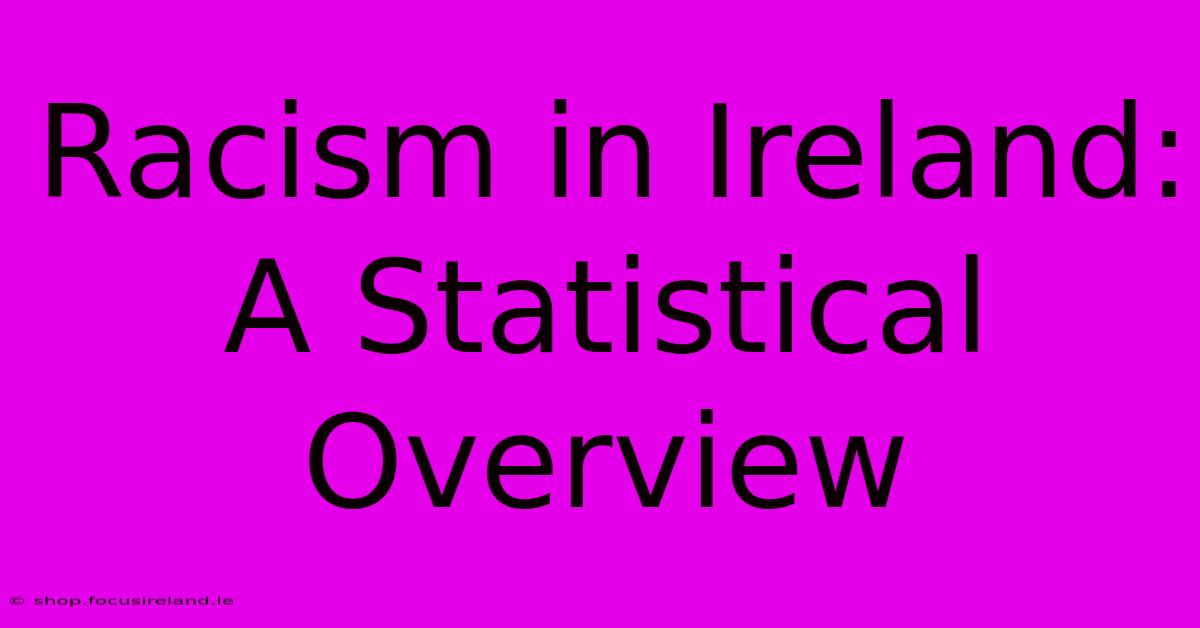Racism In Ireland: A Statistical Overview

Table of Contents
Racism in Ireland: A Statistical Overview
Ireland, often portrayed as a welcoming and tolerant nation, faces a complex reality regarding racism. While official statistics may underrepresent the full extent of the problem, available data paints a concerning picture of racial discrimination and prejudice. This article provides a statistical overview of racism in Ireland, highlighting key findings and limitations of current data collection.
The Challenges of Data Collection
One significant hurdle in understanding the scale of racism in Ireland is the lack of comprehensive and consistently collected data. Many incidents go unreported due to fear of retaliation, distrust of authorities, or language barriers. Existing datasets often lack the granular detail necessary to accurately capture the nuances of racial discrimination. This makes it difficult to paint a truly complete picture.
Existing Data Sources & Their Limitations
Several organizations and government bodies collect data related to racism in Ireland, including:
-
The Central Statistics Office (CSO): While the CSO collects data on ethnicity and immigration, it doesn't comprehensively track instances of racist incidents or hate crimes. Data on ethnicity is often aggregated and may not reflect the experiences of specific minority groups.
-
An Garda Síochána (Irish Police): Reports of hate crimes are recorded by An Garda Síochána, but underreporting remains a significant issue. The definition and categorization of hate crimes can also vary, potentially leading to inconsistencies in data.
-
Human rights organizations: Groups like the Irish Human Rights and Equality Commission (IHREC) and various NGOs conduct research and surveys, offering valuable insights but often relying on self-reported data, which can be subject to bias.
These data sources, while valuable, are fragmented and often lack the depth and breadth required for a truly comprehensive understanding of the scale and nature of racism in Ireland.
Key Statistical Findings (Where Available)
Despite data limitations, some key insights emerge:
-
Underreporting of hate crimes: Studies consistently indicate that a significant proportion of racist incidents are not reported to authorities. This significantly underestimates the actual prevalence of racism.
-
Disparities in employment, housing, and education: While precise figures are scarce, research suggests that racial minorities in Ireland experience disproportionate challenges in accessing employment opportunities, securing adequate housing, and achieving educational success. These disparities hint at the pervasive nature of systemic racism.
-
Racial profiling by law enforcement: Anecdotal evidence and some studies point to a potential over-representation of racial minorities in encounters with law enforcement, raising concerns about racial profiling. However, quantifying this definitively remains a challenge due to data limitations.
-
Increase in online hate speech: The rise of social media has unfortunately led to a significant increase in online racist abuse and hate speech targeting minority groups in Ireland. Quantifying this precisely is difficult due to the sheer volume and constantly evolving nature of online content.
The Need for Improved Data Collection
Addressing the issue of racism in Ireland necessitates a fundamental shift in data collection strategies. This requires:
-
Enhanced data collection methods: Developing more robust and inclusive methods for collecting data on racist incidents, including anonymous reporting mechanisms and improved collaboration between different agencies.
-
Improved data disaggregation: Breaking down data by ethnicity, gender, and other relevant demographic factors to gain a more nuanced understanding of the specific challenges faced by different minority groups.
-
Strengthening legal frameworks: Enacting and enforcing stricter laws against hate crimes and racist discrimination, creating a more supportive environment for reporting.
-
Community engagement: Working closely with affected communities to build trust and encourage reporting. This includes providing multilingual resources and support services.
Only through improved data collection and analysis can Ireland effectively address the pervasive issue of racism and build a truly inclusive society. The lack of robust statistics shouldn't be interpreted as an absence of the problem; rather, it highlights the urgent need for comprehensive data collection to inform effective policy and intervention.

Thank you for visiting our website wich cover about Racism In Ireland: A Statistical Overview. We hope the information provided has been useful to you. Feel free to contact us if you have any questions or need further assistance. See you next time and dont miss to bookmark.
Featured Posts
-
Ireland April 2024 Prepare For The Unexpected Weather
Mar 29, 2025
-
California To Ireland Flight Making The Most Of Your Trip
Mar 29, 2025
-
Self Guided Walking Tour Irelands Celtic Heritage
Mar 29, 2025
-
Witness The Magic Irelands Celebrated Bay
Mar 29, 2025
-
Simple Secure And Affordable Banking Everwise Ireland Road
Mar 29, 2025
